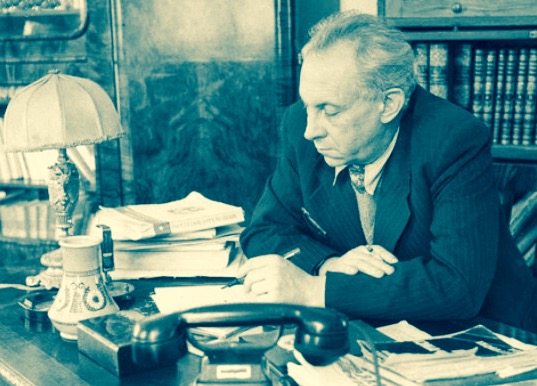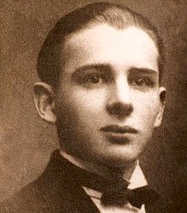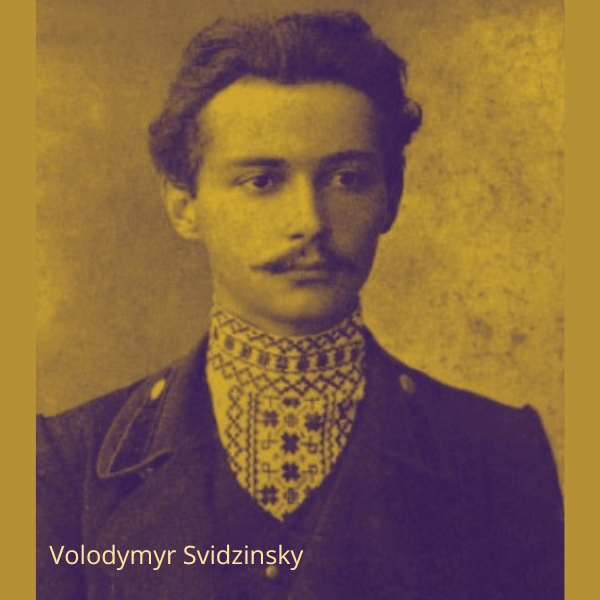POETAS DE UCRANIA, A TRAVÉS DE FRONTERAS.



Pavlo Tychyna. Ucrania (1891-1967). Sus primeros trabajos a decir de la crítica de su país, lo sitúan como uno de los grandes poetas de Ucrania de todos los tiempos. Original profundo musical y Renovador. Mientras sus pares eran asesinados por el comunismo, él se salvó de una muerte segura convirtiéndose en un poeta soviético. Lada Kolomiyets, voz del poema.
EL V I EN T O Viento! No, no viento—!temporal! Destruye, rompe, excava la tierra. Más allá de las negras nubes (¡con relámpagos! ¡Resopla!) Más allá de negras nubes, millones y millones de brazos musculares ... Rueda, cortando la tierra (sea ciudad, camino, o pradera) abriendo el terreno. Y en esa tierra—gente, bestias, jardines, Tanto como dioses y templos: ¡O, ven, ven sobre nosotros, Impone tu juicio! También habían los que se fugaron a cuevas, lagos y bosques. “¡Cuál es tu poder?” preguntaban. Y ninguno sintió alegría, ni cantó (El viento persiguió a un caballo ardiente— un caballo ardiente hasta la noche.) ¡Y solo sus muertos, ojos abiertos, reflejaban toda la belleza de un nuevo dia! Spanish Version by Robert Lima *********** THE WIND Wind, Not wind--a storm! It smashes, it breaks, excavating the earth. Beyond black clouds (With a flash! in blows!) beyond black clouds a million million Pavlo Tychyna (1891-1967) muscular arms . . . It rolls. Into the earth it cuts (whether it's a city, a road, or a meadow) A plow into the earth. And on the earth are people, beasts, and gardens, and on the earth are gods and temples: O, come, come above us, mete out judgment! And there were those who fled. To caves, lakes, and forests. "What kind of power art thou?" they asked. And no one among them rejoiced or sang. (The wind chased a fiery horse-- a fiery horse in the night) And only their dead, open eyes reflected all the beauty of a new day! Eyes. Translated by Michael Naydan ******* Вітер Павло Тичина Не вітер – буря! Трощить, ламає, з землі вириває... За чорними хмарами (з блиском! ударами!) За чорними хмарами мільйон мільйонів мускулястих рук. Котить. У землю врізає (чи то місто, дорога, чи луг) У землю плуг. А на землі люди, звірі й сади, А на землі боги і храми: О пройди, пройди над нами, Розсуди! Й були такі, що тікали В печери, озера, ліси. – Що ти за сило єси? – Питали. І ніхто з них не радів, не співав. (Огняного коня вітер гнав – Огняного коня – В ночі -) І тільки їх мертві, розплющені очі Відбили всю красу нового дня! Очі. 1919
PAVLO TYCHYNA (1891-1967)
Pavlo Tychyna was one of the leading Ukrainian poets of the modern period who began as a Symbolist. Critics have also traced the influence of Futurism and Dadaism on him. Professor John Fizer has compared him to Walt Whitman for his “cosmism.” Tychyna’s first published collection,Clarinets of the Sun (1918) was a stunning aural and visual masterpiece. His second collection Instead of Sonnets and Octaves (1920) is a powerful work that far transcended an audience of merely literary critics and other poets. Besides extraordinary poetic virtuosity in technique and a focus on paronomasia, Tychyna’s poetry expresses great philosophical depth and feeling. Tychyna introduced a new genre into Ukrainian poetry—the tragic lyric, based on elements of Ancient Greek verse. Tychyna’s early work has had an enormous impact on the development of twentieth-century Ukrainian poetry, and his early collections provide a microcosm of the cultural and historical events in Ukraine during the turbulent period of the 1917 Revolution and its aftermath. Tychyna strove to create a poetry that fused stylistic clarity with the pure and haunting sound of the clarinet—a poetry that was referred to as “clarinetism.” His third collection In the Orchestra of the Cosmos (1921) combined more prosaic elements with a futurist-oriented cosmic vision. His last great collection Wind from Ukraine (1924) has a diaristic feel to it in its description of real-life events in Tychyna’s native Ukraine, which was being consumed by the Soviet Union. While some critics consider his collection Chernihiv(1931) parodic in nature, it marks the end of Tychyna’s most fertile period as a poet. Collections like The Communist Party Leads (1934) mark his capitulation to socialist realism and turned him into an officially sanctioned Soviet “court” poet. Tychyna was saved from the grim fate of some two-thirds of the Ukrainian intellectual community in the 1930s by his acquiescence to Stalinist literary requirements. His burgeoning fame also aided considerably in his survival. Unexpurgated versions of his early and banned works were published in 1990, and he rightfully has taken the place as one of the finest Modernist poets in the Ukrainian literary pantheon. The intense musical elements in many of his poems make it extremely difficult to translate him.
Maksym Rylsky. Ucrania (1895-1964). Poeta Traductor y Doctor en Ciencias Filológicas. Publica su primer libro de poesía a los 15 años. Continuó con una obra muy importante, hasta que fue apresado y humillado por los guardias de Stalin, lo liberaron en 1932 al aceptar escribir realismo socialista. Su trabajo ha cobrado una gran importancia dentro de los poetas contemporáneos. Lectura: Lada Kolomiyets.
LLUVIA Beneficiosa, bien esperada, Cubierta de maravilloso lustre, Dorada huesped de la tarde, Cayó enérgica, fresca, resonante, Sobre edificios cenicientos De la metrópolis hambrienta. Abre tu pecho ardiente, Madre Tierra! La lluvia refresca, Da vida y fruta— Y con trigo y cebada, Un tempestuoso vestigio verde, Que traerá regocijo a pueblos blancos. Maksym Rylsky (1895-1964) Spanish Version by Robert Lima ********** 1 RAIN Maksym Rylsky (1895-1964) Beneficial, long-awaited. Covered with a wondrous sheen, A golden guest of the evening Fell briskly, freshly, with a ring, Onto the ashen buildings Of the ravenous metropolis. Open up your burning breasts, Mother Earth! The rain cools, Gives life and bears fruit-- And with the wheat and barley, A stormy green wisp, It will bring merriment to white villages. Translated by Michael Naydan ******** Дощ Максим Рильський Благодатний, довгожданий, Дивним сяйвом осіянний, Золотий вечірній гість Впав бадьоро, свіжо, дзвінко На закурені будинки Зголоднілих передмість. Відкривай гарячі груди, Мати земле! Дощ остудить, Оживить і запліднить,- І пшеницею й ячменем Буйним повівом зеленим Білі села звеселить. 1925 ************
MAKSYM RYLSKY (1895-1964)
Maksym Rylsky was a member of the Neo-Classicist group of Ukrainian poets and a translator, folklorist, and literary scholar, who worked most of the earlier part of his life as a teacher of philology. He published his first book of poetry at the precocious age of fifteen—On White Islands(1910). His other early books of poetry include The Edge of the Forest: Idylls (1918), Under Autumn Stars (1918), The Blue Distance (1922), Long Poems (1924), Through a Storm and Snow (1925), Beneath Autumn Stars (1926), Thirteenth Spring (1926), Where Roads Meet (1929), and Echo and Re-echo (1929). Arrested and humiliated publicly by Stalin’s secret police, the NKVD, in Kyiv in 1931, he was released in 1932 after agreeing to write in the style of socialist realism in service to the Soviet state. During the wartime period he wrote two masterful long poems that deviated from socialist realism—“Thirst” (1942) and “Journey to Youth” (1941-4), for which he was again publicly chastised. He published some 30 total collections of original poetry, and by 1974 nearly five million copies of his works in the original or in translation had appeared in the USSR. In his last two books—In the Shadow of the Lark (1961) and Winter Notes (1964) published during The Thaw, a period of relaxed censorship during the reign of Nikita Khrushchev, Rylsky’s poetic voice returned to its previous lyrical power. There are several prominent strains in Rylsky’s poetry: love poetry, lyrical meditations on nature, metapoetry on art, music and other poets, and civic poetry, the latter in which he rises up to defend his homeland Ukraine in existential situations such as World War II. Rylsky’s poetry focuses on sound and metaphors, the acoustic beauty of the Ukrainian language. His poetry greatly influenced among many others the later 20th-century poet Lina Kostenko, who has dedicated several of her works to him. Rylsky is a poet who largely writes in a melodic and highly lyrical style that changes little over his creative lifetime (other than the coerced unnatural departure into the style of socialist realism).
Bohdan Ihor Antonych Ucrania (1909-1937). Poeta y Ensayista. Solo vivió 28 años. Gran poeta de su tiempo. Se dice que bebió del Folcklor y lo expresó en su poesía con el idioma original de los pueblos, esta lengua que usó el poeta se ha borrado casi en su totalidad. La comunidad étnica que el poeta expresaba fue destruida en la llamada operación Vístula. Lada Kolomiyets lee en Ucraniano.
TAFETAN ROJO Translated by Michael Naydan Bohdan Ihor Antonych (1909-1937) Supersticiones del pasado—de sueños brillantes-- queman como fogatas. La ciudad de mi juventud está en el tafetán rojo del ocaso. Las estrellas charlan en los chopos y la gente, afligida, se cruzan cuando Hassidim en negras sinagogas intentan apuñalar la luna con cuchillos ... Mi pueblo se hace misterioso tras la cortina de recuerdos juveniles! Y, de nuevo, la antigua juventud llama como llaman las viejas supersticiones. Spanish versión by Robert Lima ********** RED TAFFETA Богдан-Ігор Антонич Bohdan Ihor Antonych (1909-1937) Superstitions of past ages--of sparkling dreams burn like bonfires. The city of my youth is in the red taffeta of sunset. Stars chatter on poplars and people cross themselves in distress, when Hassidim in black synagogues stab at the moon with knives... My town is mysterious in the curtain of boyhood recollections! And again past youth calls the way old superstitions call. Translated by Michael Naydan ************** Червона китайка Горять, як ватра, забобони віків минулих – снів іскристих. В китайці заходу червоній моєї молодости місто. Лопочуть зорі на тополях і люди христяться з тривоги, коли ножами місяць колють хасиди в чорних синагогах. Моє містечко таємниче в хлоп’ячих споминів заслоні! І знов минула юність кличе, як давні кличуть забобони. 1936 ***
BOHDAN IHOR ANTONYCH (1909-1937)Bohdan Ihor Antonych fue un poeta y ensayista extraordinariamente innovador originario de la montañosa región de Lemko (ahora en Polonia), donde se habla un dialecto de ucraniano influenciado por el polaco. Antonych se mudó a Lviv para estudiar en la Universidad de Lviv. Allí aprendió a escribir en ucraniano literario y cultivó su conocimiento de la cultura ucraniana. Su poesía revitalizó el vocabulario de la poesía ucraniana en la década de 1930, y fue extraordinariamente influyente en una serie de poetas ucranianos de los años 60 y 80, especialmente Yuri Andrukhovych, uno de los principales escritores ucranianos que escriben hoy. La poesía de Antonych abarca una serie de temas desde lo profundamente metafísico a lo mundano. A diferencia de las tendencias nacionalistas de varios poetas occidentales ucranianos en su época, el enfoque de Antonych era un arte por el arte, uno con principios estéticos elevados. Sus colecciones publicadas incluyen: Un saludo a la vida (1931), Tres anillos (1934), El libro del león (1936), El evangelio verde (1938) y Rotaciones (1938). Los dos últimos libros fueron publicados póstumamente. Otra colección de poemas sobre temas religiosos escrita en 1932, The Grand Harmony, se publicó por primera vez en su totalidad en 1967 en Nueva York.
BOHDAN IHOR ANTONYCH (1909-1937)
Bohdan Ihor Antonych was an extraordinarily innovative poet and essayist originally from the mountainous Lemko region (now in Poland), where a dialect of Ukrainian influenced by Polish is spoken. Antonych moved to Lviv to study at the University of Lviv. There he learned to write in literary Ukrainian and cultivated his knowledge of Ukrainian culture. His poetry reinvigorated the vocabulary of Ukrainian poetry in the 1930s, and he was extraordinarily influential on a number of Ukrainian poets of the 1960s and 1980s, especially Yuri Andrukhovych, one of the leading Ukrainian writers writing today. Antonych’s poetry covers a number of themes from the profoundly metaphysical to the mundane. As opposed to the nationalist tendencies of a number of Western Ukrainian poets in his time, Antonych’s approach was an art for art’s sake one with high-minded aesthetic principles. His published collections include: A Greeting to Life (1931), Three Rings (1934), The Book of the Lion (1936), The Green Gospel (1938), and Rotations (1938). The latter two books were published posthumously. Another collection of poems on religious themes written in 1932, The Grand Harmony, was first published in its entirety in 1967 in New York.
Bibliographic information:
| Title | Hundred years of youth: a bilingual anthology of 20th century Ukrainian poetry |
| Editors | Olʹha Luchuk, Michael M. Naydan |
| Publisher | Litopys, 2000 |
| Original from | the University of Michigan |
| Digitized | Apr 30, 2008 |
| Length | 877 pages |
BOHDAN IHOR ANTONYCH (1909-1937)Bohdan Ihor Antonych fue un poeta y ensayista extraordinariamente innovador originario de la montañosa región de Lemko (ahora en Polonia), donde se habla un dialecto de ucraniano influenciado por el polaco. Antonych se mudó a Lviv para estudiar en la Universidad de Lviv. Allí aprendió a escribir en ucraniano literario y cultivó su conocimiento de la cultura ucraniana. Su poesía revitalizó el vocabulario de la poesía ucraniana en la década de 1930, y fue extraordinariamente influyente en una serie de poetas ucranianos de los años 60 y 80, especialmente Yuri Andrukhovych, uno de los principales escritores ucranianos que escriben hoy. La poesía de Antonych abarca una serie de temas desde lo profundamente metafísico a lo mundano. A diferencia de las tendencias nacionalistas de varios poetas occidentales ucranianos en su época, el enfoque de Antonych era un arte por el arte, uno con principios estéticos elevados. Sus colecciones publicadas incluyen: Un saludo a la vida (1931), Tres anillos (1934), El libro del león (1936), El evangelio verde (1938) y Rotaciones (1938). Los dos últimos libros fueron publicados póstumamente. Otra colección de poemas sobre temas religiosos escrita en 1932, The Grand Harmony, se publicó por primera vez en su totalidad en 1967 en Nueva York.


